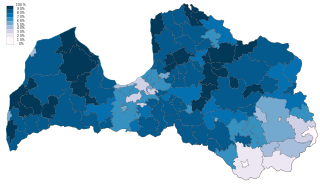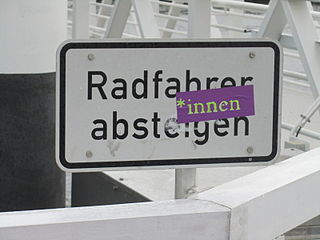
German is a West Germanic language in the Indo-European language family, mainly spoken in Western and Central Europe. It is the most spoken native language within the European Union. It is the most widely spoken and official language in Germany, Austria, Switzerland, Liechtenstein, and the Italian autonomous province of South Tyrol. It is also an official language of Luxembourg, Belgium and the Italian autonomous region of Friuli-Venezia Giulia, as well as a recognized national language in Namibia. There are also notable German-speaking communities in France (Alsace), the Czech Republic, Poland, Slovakia, Denmark, Romania and Hungary (Sopron). Overseas, sizeable communities of German-speakers are found in Brazil, South Africa (Kroondal), Namibia, among others, some communities have decidedly Austrian German or Swiss German characters.

Norwegian is a North Germanic language from the Indo-European language family spoken mainly in Norway, where it is an official language. Along with Swedish and Danish, Norwegian forms a dialect continuum of more or less mutually intelligible local and regional varieties; some Norwegian and Swedish dialects, in particular, are very close. These Scandinavian languages, together with Faroese and Icelandic as well as some extinct languages, constitute the North Germanic languages. Faroese and Icelandic are not mutually intelligible with Norwegian in their spoken form because continental Scandinavian has diverged from them. While the two Germanic languages with the greatest numbers of speakers, English and German, have close similarities with Norwegian, neither is mutually intelligible with it. Norwegian is a descendant of Old Norse, the common language of the Germanic peoples living in Scandinavia during the Viking Age.

Latvian, also known as Lettish, is an East Baltic language belonging to the Indo-European language family and it is spoken in the Baltic region. It is the language of Latvians and the official language of Latvia as well as one of the official languages of the European Union. There are about 1.5 million native Latvian speakers in Latvia and 100,000 abroad. Altogether, 2 million, or 80% of the population of Latvia, spoke Latvian in the 2000s, before the total number of inhabitants of Latvia slipped to 1.8 million in 2022. Of those, around 1.16 million or 62% of Latvia's population used it as their primary language at home, though excluding the Latgale and Riga regions it is spoken as a native language in villages and towns by over 90% of the population.

Cimbrian is any of several local Upper German varieties spoken in parts of the Italian regions of Trentino and Veneto. The speakers of the language are known as Zimbern in German.

Bavarian, alternately Austro-Bavarian, is a major group of Upper German varieties spoken in the south-east of the German language area, including the German state of Bavaria, most of Austria and the Italian region of South Tyrol. Prior to 1945, Bavarian was also prevalent in parts of the southern Sudetenland and western Hungary. Bavarian is spoken by approximately 12 million people in an area of around 125,000 square kilometres (48,000 sq mi), making it the largest of all German dialects. In 2008, 45 percent of Bavarians claimed to use only dialect in everyday communication.
In Modern English, it is a singular, neuter, third-person pronoun.

August Schleicher was a German linguist. Schleicher studied the Proto-Indo-European language and devised theories concerning historical linguistics. His great work was A Compendium of the Comparative Grammar of the Indo-European Languages in which he attempted to reconstruct the Proto-Indo-European language. To show how Indo-European might have looked, he created a short tale, Schleicher's fable, to exemplify the reconstructed vocabulary and aspects of Indo-European society inferred from it.

Northern Bavarian is a dialect of Bavarian, together with Central Bavarian and Southern Bavarian. Bavarian is mostly spoken in the Upper Palatinate, although not in Regensburg, which is a primarily Central Bavarian–speaking area, according to a linguistic survey done in the late 1980s. According to the same survey, Northern Bavarian is also spoken in Upper Franconia, as well as in some areas in Upper and Lower Bavaria, such as in the areas around Eichstätt and Kelheim. Few speakers remained in the Czech Republic, mostly concentrated around Aš and Železná Ruda, at the time of the survey, but considering the time which has passed since the survey, the dialect may be extinct in those places today. If it still exists there, it would include the ostegerländische Dialektgruppe. Ethnologue estimates that there were 9,000 speakers of Bavarian in the Czech Republic in 2005, but does not clarify if these were Northern Bavarian speakers.
Early New High German (ENHG) is a term for the period in the history of the German language generally defined, following Wilhelm Scherer, as the period 1350 to 1650, developing from Middle High German and into New High German.

Bats, also known as Batsbi, Batsi, Batsb, Batsaw, or Tsova-Tush) is the endangered language of the Bats people, a North Caucasian minority group living in the Republic of Georgia. Batsbi is part of the Nakh branch of Northeast Caucasian languages. It had 2,500 to 3,000 speakers in 1975, with only one dialect. Batsbi is only used for spoken communication, as Bats people tend to use Georgian when writing.

Robert Stephen Paul Beekes was a Dutch linguist who was emeritus professor of Comparative Indo-European Linguistics at Leiden University and an author of many monographs on the Proto-Indo-European language.

"The Man That Corrupted Hadleyburg" is a piece of short fiction by Mark Twain. It first appeared in Harper's Monthly in December 1899, and was subsequently published by Harper & Brothers in the collection The Man That Corrupted Hadleyburg and Other Stories and Essays (1900). Some see this story "as a replay of the Garden of Eden story", and associate the corrupter of the town with Satan.

A Tramp Abroad is a work of travel literature, including a mixture of autobiography and fictional events, by American author Mark Twain, published in 1880. The book details a journey by the author, with his friend Harris, through central and southern Europe. While the stated goal of the journey is to walk most of the way, the men find themselves using other forms of transport as they traverse the continent. The book is the fourth of Mark Twain's six travel books published during his lifetime and is often thought to be an unofficial sequel to the first one, The Innocents Abroad (1869).
The German-Russian pidgin is a macaronic language of mixed German and Russian that appears to have arisen in the early 1990s. It is sometimes known as Deutschrussisch in German or Nemrus in Russian. Some speakers of the mixed language refer to it as Quelia. It is spoken by some russophone immigrants in Germany from the former Soviet Union.

A system of grammatical gender, whereby every noun was treated as either masculine, feminine, or neuter, existed in Old English, but fell out of use during the Middle English period; therefore, Modern English largely does not have grammatical gender. Modern English lacks grammatical gender in the sense of all noun classes requiring masculine, feminine, or neuter inflection or agreement; however, it does retain features relating to natural gender with particular nouns and pronouns to refer specifically to persons or animals of one or other sexes and neuter pronouns for sexless objects. Also, in some cases, feminine pronouns are used by some speakers when referring to ships, to churches, and to nation states and islands.

In linguistic morphology, inflection is a process of word formation in which a word is modified to express different grammatical categories such as tense, case, voice, aspect, person, number, gender, mood, animacy, and definiteness. The inflection of verbs is called conjugation, while the inflection of nouns, adjectives, adverbs, etc. can be called declension.

The Gesellschaft für deutsche Sprache, or GfdS, is Germany's most important government-sponsored language society. Its headquarters are in Wiesbaden. Re-founded shortly after the Second World War in 1947, the GfdS is politically independent and the declared successor of the Allgemeiner Deutscher Sprachverein, the General Association for the German Language, which had been founded in 1885 in Brunswick. Its aim is to research and cultivate the German language; to critically evaluate the current German language change; and to give recommendations concerning the current usage of German.
Brittonicisms in English are the linguistic effects in English attributed to the historical influence of Brittonic speakers as they switched language to English following the Anglo-Saxon settlement of Britain and the establishment of Anglo-Saxon political dominance in Britain.

In German, a medial capital I is a non-standard, mixed case typographic convention used to indicate gender inclusivity for nouns having to do with people, by using a capital letter 'I' inside the word surrounded by lower-case letters. An example is the word LehrerInnen. With a lower case I in that position, Lehrerinnen is just the standard word for "female teachers".

The gender star is a nonstandard typographic style used by some authors in gender-neutral language in German.
















